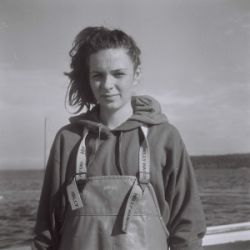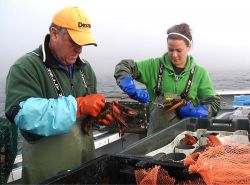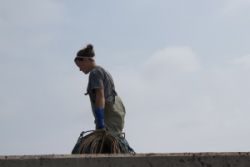Halifax Media Co-op
News from Nova Scotia's Grassroots
Well Fished: Women and our Fishing Future, by Corinne Dunphy
This blog was originally posted at Small Scales, the excellent East Coast fisheries blog administered by the Marine Issues Committee of the Ecology Action Centre. Follow the always interesting Marine Issues Committee on Twitter.
I’m not a morning person. The sound of footsteps puttering around in the kitchen was enough to make me queasy at 3:30 am. In times like these, the aroma of bacon is the only thing that can spark my motor system – and that it did. Every morning at the Conway hut in Whitehead, I was greeted with bacon, boiled eggs, white toast and coffee- the proper thing! And oh I was so grateful. The hut, the Conway’s temporary fishing season home, was sweltering from the wood stove, and you could see the sun in the distance begin to lift from the watery horizon.
Fallon Conway was not much of a morning person either, and everyone knew it. She didn’t say much until she hit the water, at which point she became a chatterbox until we started all over the next morning.
Well Fished is a short documentary film exploring the lives of two young Nova Scotian women who, unlike other many their age, dream of living a life working on the Atlantic. Nova Scotia’s population and landscape have drastically changed throughout the decades. The role of women was also transformed with the passing of traditional gender roles and the decline of the male dominated fishing industry. The film portrays Grace MacDougall and Fallon Conway’s connection to Atlantic Canada’s older and disappearing fishing traditions.
The setting for the film is northeastern Nova Scotia. Here lies two neighboring communities, both bound by character, shared history, friendly faces and access to the bone-chilling Atlantic Ocean. Grace lives in Antigonish, Fallon in Whitehead. Although the two have never met, they share parallel early mornings and even earlier evenings.
Out on the water you can feel the wind in your hair, the salt on your face and the wetness seeping into your socks. I did not take into account that shooting on an ever-moving surface with little to no experience using my gear would make for a bit of an obstacle. I am also prone to motion sickness. A small detail I forgot when writing out my thoughts, my objectives, and my motives on why I just needed to make this documentary. When I was young, I was truly a pleasure to take on every windy road through the Cape Breton highlands to the cottage, every rink on the icy roads during the winter.
Gravol was my friend this spring, but there was one morning that I just couldn’t handle the swallowing sea. One terribly rough day out on the Eastern Maverick in Whitehead, that old queasy feeling came rushing back. At first, I didn’t let the crew know- I was embarrassed. Fishermen don’t get seasick… correct? But when my face turned an icy blue-green, they figured it out pretty fast. I downplayed how I actually felt, but to my surprise, they all were in the same boat (so to speak). In fact, Captain Pat told me he had dealt with seasickness for years, to the point of being hospitalized on one occasion. The work still needed to get done, and with that said, I continued. But I was never happier to step on land.
Grace and Fallon were wonderful participants. They brought unique and complimentary perspectives to the film. Fallon, a recent graduate of high school had a lively spirit when it came to sharing her home, lifestyle and family history. Like most eighteen year olds, she bared complex feelings when it came towards her work. Exhaustion, early mornings, and hard work were tough on her, but by the end of the day when she would be proud of her efforts, and be ready to get up and do it all over the next morning. I admired her enthusiasm, and her love for the place she was born and raised.
The dynamic that would ensue on the MacDougall family boat Jan and Grace was comical and made me look forward to stepping on the boat each morning. Grace takes her work with seriousness, and is confident with her decisions of wanting to try to make a life in the industry. I say Grace is just a chip off the ole block of her father. “You know Corinne, once Grace told me that if we went to high school together, we would probably be the best of friends,” her father told me. They also showed as much interest in my film-making process and I did to their practices. They challenged me, and often made me consider my shooting decisions.
For generations, women’s relationship to fishery work largely depended upon their relationships with men. There are few options for working women in the industry due to circumstances- plants closing down, employment insurance benefits getting cut, even relationships ending with their partners. But the role of women in fishing families is shifting.
Grace told me one evening at her home in North Grant that, “you definitely feel a little different on the wharf. We know what we’re doing and we have proven ourselves and that it doesn’t have to be a male’s job. There are a few female captains around Antigonish County. Aside from people just kind of taking you a little less serious and assuming that you couldn’t handle it in the first place, it doesn’t feel different at all. My sister got married this summer and I took her out for her bachelorette party and took all her friends out on the boat, and people were surprised that I could handle the boat “like oh my god aren’t you tough, like you’re tough to do that!. It’s not like they don’t like seeing it, there just seeing it the first time”.
Perhaps what is of greatest importance when considering the lifeline of small-scale fisheries future is the lack of youth working in the sector. With so many young people leaving Nova Scotia, imagining this future is increasingly difficult. Some of the richest knowledge is from the mouths of those within the communities – the men and the women who live the fishing life on a daily basis. However, decisions concerning the future of the fisheries are being made by people who do not live in the rural communities and do not know their needs.
Grace and Fallon are living the fishing lifestyle today essentially because of their family’s generational continuity in the industry. Effective management and protection for our small-scale family fisheries is crucial to keep the money circulating in seaside communities. Women’s roles are becoming more prominent and play an important role with the younger generation, the future of Nova Scotians striving to work and live in the province.
Fallon and Grace continue to fish with their fathers. Fallon has moved back to Whitehead and is pursuing photography in the off-season. Grace is working as a personal trainer when she’s not fishing lobster or crabbing with her dad. As for me, I am trying to make this very expensive hobby of documentary film-making turn into some sort of feasible source of small income in Toronto. I am currently developing a documentary entitled Meanwhile Back East which is a short that brings together the shared experiences of three Atlantic Canadian wives, who stay at home while their husbands head west to the oil sands.
You can watch the full documentary online here.
Corinne Dunphy is a Nova Scotian born and raised artist specializing in social documentary. She earned an MFA in Documentary Media at Ryerson University and a BFA at NSCAD University. As a visual storyteller, Dunphy gravitates towards everyday characters and land-driven themes. Her works has been exhibited in Canada and the United States. She is currently living in Toronto, Ontario.
The site for the Halifax local of The Media Co-op has been archived and will no longer be updated. Please visit the main Media Co-op website to learn more about the organization.






